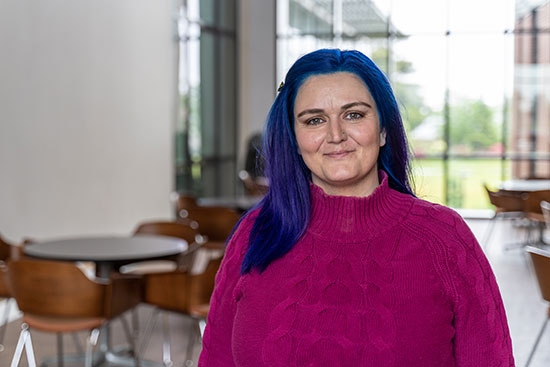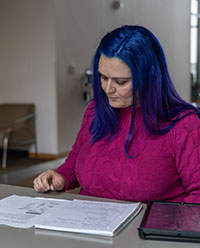Student Spotlight - Michelle Perry

Why did you choose EvCC?
I chose EvCC because it was close to home and had a business education program.
What challenges did you face before coming to EvCC? How did those challenges affect your experience as a student?
Before coming to EvCC I had a life of addiction, domestic violence, and losing my children. I knew I would face challenges because I had suffered two overdoses, and an infection in my arm started to develop in my bloodstream. Weeks prior to starting at EvCC, I went through an intense withdrawal from methadone, which needed to happen to continue my journey in the direction I was looking to go. As a student, my brain was not as bright as it used to be when I was younger, before the bad choices that I had made throughout the years, but I had developed a plan to help me succeed through resilience and perseverance.
What are you studying at EvCC?
I originally started in a business ATA degree through Workforce Funding, however, once I was able to get approved for financial aid, I transferred that degree to Business DTA. Earlier this year, after experience working at Providence Regional Medical Center, I decided to change my plan to earn an Associate Degree in Arts and Sciences - Direct Transfer Agreement with plans to focus on mental health and substance abuse treatment in a healthcare setting. Upon graduation I plan to enroll in Western Washington University's Human Services program. I have realized where my passion is and that is on the front lines with our community helping to save lives. I hope to graduate from EvCC in June 2023.
Who helped you succeed at EvCC (faculty member, staff, etc.)? What did that person do to help you?
My program advisor Lynne Munoz has been an amazing force in helping me achieve my goals, despite the winding road that I have been on since attending school at EvCC.
Describe the best experience you had at EvCC.
I enjoyed all of my business classes, but if I had to describe my best experience, I would have to say it was public speaking and business communications. Taking public speaking has given me strength to power through my fear in speaking to a big audience, building up my self esteem, and enabling me to use less jargon while trying to capture the attention of my audience. With business communication, I gained the skills of working with others with all types of degrees, not just business. In addition, I was able to learn about business communication and interview techniques. All of this has helped me along my journey.
You’ve spoken openly and bravely about your experience with addiction. What do you want students and the community to know about your experience?
When it comes to addiction, this is like reading a book…it is a story, but more so, it is my story. It is my hope that by sharing my story openly that it will bring hope, strength, and prosperity to more students who may not have found their voice, especially those who feel worthless and have self-esteem and self-image issues. My hope is to inspire students to push forward to know that a choice of addiction does not have to dignify your future. Use your story to give inspiration to our society as a whole.
Tell us about your job working as a Peer Support Specialist for Providence Regional Medical Center! Why did you decide to take that job, and what do you hope to accomplish by providing peer support in the emergency room?
This is something that I am extremely passionate about. When I heard about this role, a part of my addiction (self-talk) started creeping up in my mind saying “Michelle, you may be capable but you will never get the job.” I went into the interview nervous, but I just told my story.
I am part of a team of three certified peer counselors in a clinical research study that will be conducted in the emergency department. I work directly with patients (peers) who have overdosed in the last 30 days. I’m their first contact after they have enrolled in the study while in the emergency room, prior to discharge. The goal is to show that more peer support is needed in the emergency department, as opposed to discharging and connecting to a peer after discharge.
It is my goal to have the opportunity to show patients that recovery is possible and just lead by example. I came from a very bad place, but I am not a victim…I am a survivor. There is no magic pill, just the desire to want more out of life.
 What do you wish you'd known about EvCC sooner?
What do you wish you'd known about EvCC sooner?
I wish I had known more about services available to students that struggle with educational needs. Sometimes it is hard to step outside your comfort zone. Additionally, I am a huge advocate for the Developmental Education classes. These are not required courses, but I believe they should be because they helped me learn my learning style, how to manage my time, meditation techniques, along with other skill sets.
What advice do you have for new students?
My advice would be to communicate with your advisor on a frequent basis and find someone that matches your personality style. Every advisor or student may not mesh well together. Also be mindful that there are counseling services available. Returning to college after years away is very overwhelming, but the counseling services are there to help as is the Center for Disability Services. All of these services I did not have right away. Had I known about these early on, I may have been better successful than what I originally was.
Anything else you want to add?
Throughout my journey my biggest support was my new husband, Sean Anderson. He is also an employee at Providence Regional Medical Center with the Security Department. Without his support, this process would have been more challenging than anything. I have had days where I had to vent my frustrations, cry, scream, vocalize the self-talk. At the end of the day he began re-iterating my strength that I had inside me the whole time. Above anything I have mentioned, always be true to yourself. Be patient, be kind, and know that the best person is your own self!

